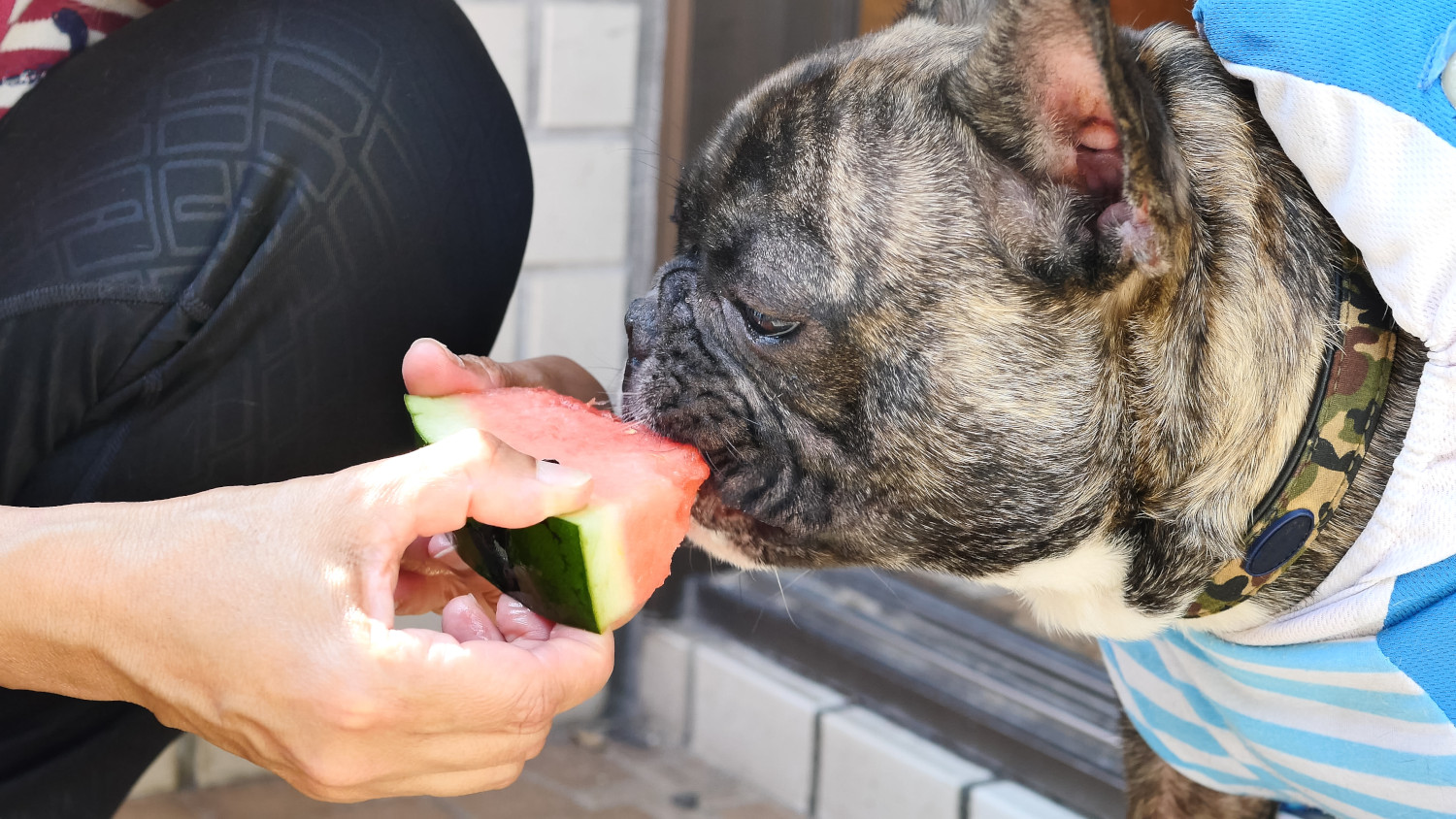
Dogs, our good old companions of all times, do not remain just pets. They become a family to us, which means they will be near our dining tables at lunch and in bed while we nibble on our favorite snack. Also, they are unlikely to steal a bite of our snacks as well. Our carnivorous best friends, with remarkable digestive abilities, often give us the wrong impression about their digestive systems. Just because they can efficiently process chunks of meaty bones does not mean they can eat and digest anything and everything.
The digestive working of a dog is much different from the digestive working of a human. It is because of this reason; we have to be careful about feeding things to dogs.
So Can Dogs eat watermelon? Yes! Dogs can safely consume watermelons. You have to be careful about the rind and seeds. Dogs do not easily tolerate them. Also, keep in mind the quantity that you are giving to your pet; a large amount is often problematic for them. Dogs are enthusiastic eaters; remember to feed them in wedges or pieces.
The next time your friend is eyeing your juicy snack, feel free to share it with him. This snack is a full package to keep your pet hydrated with additional nutrients that not present in drinking water. While most dogs can eat watermelon without any danger, keep in mind that all dogs are different.
Look out of any intolerance and allergy; there is a possibility that your dog might not be able to handle watermelons. It’s sporadic for something like this to happen, but caution does not hurt anybody.
You might also like our review of the Low Fat Dog Food Brands for Pancreatitis, available on a separate page.
What makes Watermelon an excellent snack?
Now that we have addressed the question “Can dogs eat watermelon?” let’s dig deeper into the topic and know more about watermelons and how their consumption can be made safe for dogs.
Good source of hydration
Watermelons are available around the year in several forms, but predominantly it is summer fruit. It is about 92% water. This makes it an excellent source of water with added healthiness in a small amount of sugar and micronutrients.
Hot summers can take a toll on the hydration status of your pets too. We all are aware that dogs feel too much heat, and because of this, it is important to feed them something nice to keep them hydrated. Bulky and heavily nutritious snacks are hard to consume. Increased water intake can also contribute to a decrease in hunger.
On a hot day with scorching sun, watermelon can be the savior of you and your dog. It is refreshing and very light on the stomach. Thus, it can be a good alternative to drinking water in bulk. Watermelon is lightweight for humans, humans, and pets, but moderation is a must for pets.
Extra sugar for boast in energy
Despite all the anatomical and physiological differences that we have with dogs, they similarly metabolize nutrients to humans. This means like glucose is a primary source of energy for our pets as well. Maintaining body temperature is extra hard in summers, and excessive calories are spent on it.
In addition to water, watermelon contains a small amount of sugar (around 6%). Apart from hydration, watermelon helps maintain good energy levels in your pet. Snacking on this will make them feel less lethargic and lazy on a hot summer day.
Extra Nutrients
The larger percentage of watermelon comes from water, but that does not mean water is all that watermelon contains. The remaining percentage of watermelon comprised of micro-nutrients is essential for your four-legged friend. Watermelon is a good source of vitamin A, B6, lycopene, and potassium, which are all important in maintaining your pet’s overall health.
Some recipes to make the watermelon snacking fun
Freeze it – Frozen watermelon or frozen juice is tasty treats for dogs on a hot summer day. It adds the extra refreshing pop to the fruit.
Touch of dairy – if your dog does well with dairy, adding a touch of frozen yogurt along with watermelon is a good idea. Freeze both the ingredients together in bite sizes.
What watermelon ingredients are off-limits to dogs?
Dogs can consume watermelons, yes. But here are some of the things that should be kept in mind while feeding your pet.
- Seeds: the seeds of watermelon are harmful to dogs, especially in excess. If you accidentally feed your dog a few seeds (1-3 seeds) with pulp, nothing to worry about. Any more than that can cause digestive issues and disturbances. Dogs cannot digest the seeds properly; hence they can lead to obstruction of the digestive system.
- Rind: the hard outer part of a watermelon is also problematic for dogs. Rind consumption can cause diarrhea and watery stool. The unripe portion is often found near the out layer. Remove a thick layer of rind while chopping the fruit for your dog. Feed the pulp that is soft and fully ripe. This will remove any hard covering that can cause problems in the gastrointestinal tract.
What can excessive consumption of watermelon do?
Too much of a good thing is always harmful, which applies to watermelon as well. Dogs are usually hasty when it comes to eating. Often they are impatient to eat their favorite snack. This can lead to overconsumption and excessive eating. When it comes to watermelon, excessive consumption manifests similarly as it does in humans.
- Vomiting – When dogs overfeed on watermelon when they are likely to vomit. The bowel moment will expel the excess that will result in vomiting.
- Constipation – An excessive amount of watermelon means that your dog is likely to get into constipation. Seeds and rinds of watermelon are harmful to your little friend, and overconsumption of these parts will lead your dog to experience constipation that will cause distress. To avoid overeating, portion size should always be kept in mind, along with the size of a dog.
A pug will not need the same amount of watermelon as a Shepard.
When your dog over feed on watermelon then try to keep it hydrated. In case the situation worsen make sure to take your pet to the vet.
Some precautions
- Always give bite-size pieces that can easily fit in your mouth to your dog; extremely small pieces (size of nuts and almonds) can also lead to choking hazards.
- Keep an eye on your dog while it eats, so the hazards of not chewing can be avoided.
Conclusion
Thus watermelon is a safe and healthy treat for your companion. You can develop several variations of it to make eating more fun for your dog. Care should always be taken, whether it’s watermelon or any other food. It helps ensure the pet’s health and avoids anything that might be harmful for consumption.
Give watermelon to your beautiful dog by all means but make sure that you are taking moderation into consideration.
